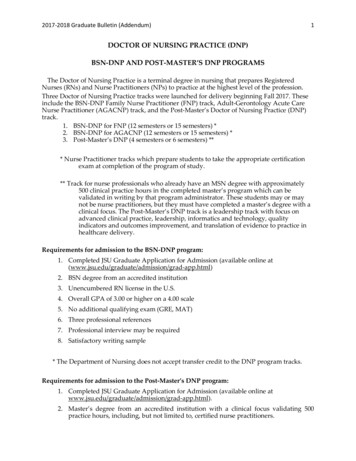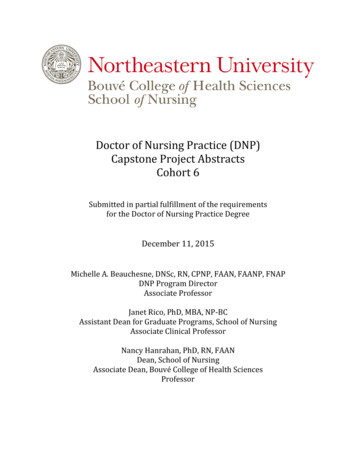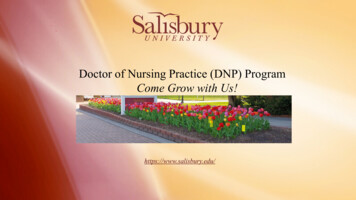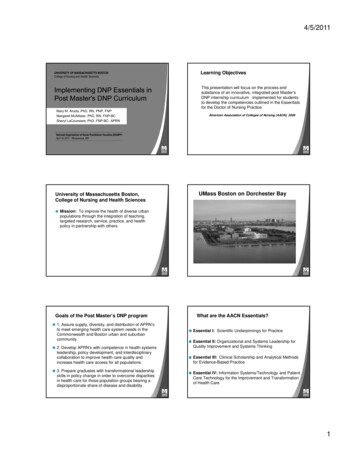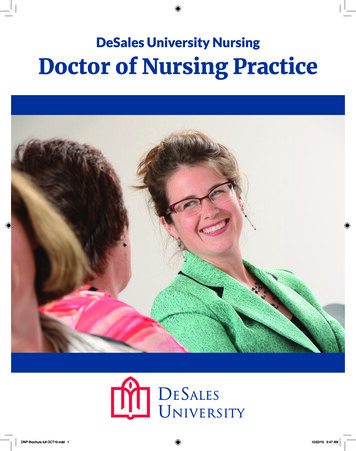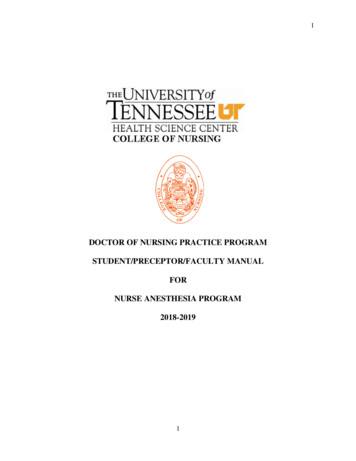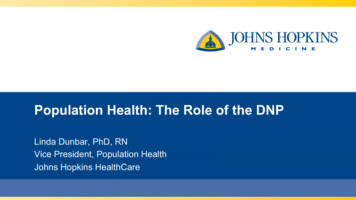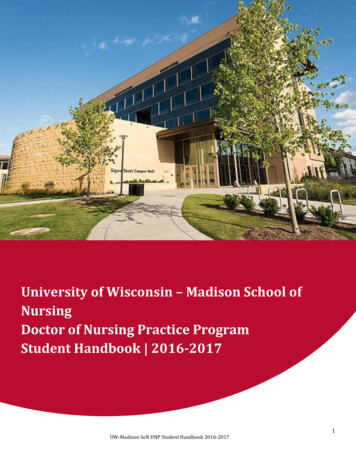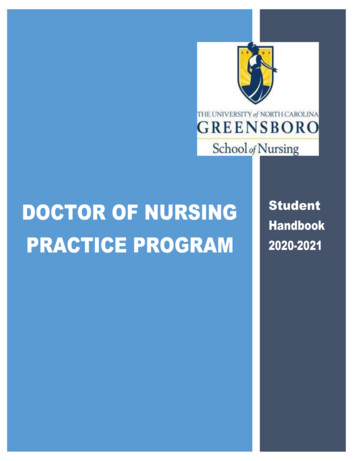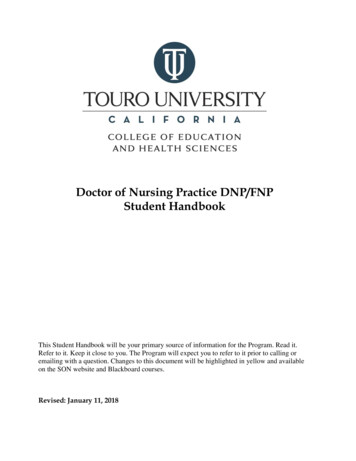
Transcription
Doctor of Nursing Practice DNP/FNPStudent HandbookThis Student Handbook will be your primary source of information for the Program. Read it.Refer to it. Keep it close to you. The Program will expect you to refer to it prior to calling oremailing with a question. Changes to this document will be highlighted in yellow and availableon the SON website and Blackboard courses.Revised: January 11, 2018
Table of ContentsTOURO UNIVERSITY CALIFORNIA . 4INTRODUCTION . 4Non-Discrimination Policy . 4Historical Perspective . 4Mission of Touro College . 5Vision Statement of Touro University California . 5Mission of Touro University California . 5Values of Touro University California . 6Institutional Learning Outcomes . 6Accreditation . 6Doctor of Nursing Practice Program . 6DOCTOR OF NURSING PROGRAM STUDENT HANDBOOK OVERVIEW . 10MISSION STATEMENT . 10PURPOSE. 10VALUES . 11VISION . 11PROGRAM STUDENT LEARNING OUTCOMES . 11DNP ESSENTIALS . 12Incorporation of Specialty-Focused Competencies into DNP Curricula. 13Advanced Practice Nursing Focus . 13NURSE PRACTITIONER CORE COMPETENCIES . 14CURRICULUM. 16COURSE DESCRIPTIONS . 17CLINICICAL HOURS FOR COMPLETION . 20FAMILY NURSE PRACTITIONER LICENSURE BOARD OF REGISTERED NURSINGCALIFORNIA . 20FAMILY NURSE PRACTITIONER FURNISHING NUMBER BOARD OF REGISTEREDNURSING CALIFORNIA . 21FAMILY NURSE PRACTITIONER CERTIFICACTION . 21GRADUATE NURSING STUDENT CLEARANCE REQUIREMENTS . 21Drug and Alcohol Screen: . 21Criminal Background Check: . 21CPR Certification: . 22Personal Health Insurance:. 22Health Admission Requirements . 22SUPPLIES . 22Medical Supplies . 22Laptop/Tablet Requirements: . 23Technology . 23Books . 24SCHOOL OF NURING FACULTY/STAFF DIRECTORY . 24PROGRAM SPECIFIC POLICIES & PROCEDURES . 24PURPOSE OF THIS SECTION . 24GOVERNANCE . 252
ATTENDANCE . 25ABSENCES . 25HOLIDAYS . 26STUDENT TIME AWAY REQUESTS. 26USE OF WIRELESS DEVICES IN THE CLASSROOM . 26INTERNET SERVICES AND USER-GENERATED CONTENT POLICY, INCLUDINGSOCIAL MEDIA POLICY . 26COMMUNICATION WITH THE PROGRAM AND THE UNIVERSITY . 27RECORDING OF LECTURES. 28GRADING . 28Grade Appeal . 29ACDEMIC INTEGRITY . 29Student Discipline Procedures . 29ACADEMIC ADVISING. 29GRIEVANCE POLICY . 29LEAVE OF ABSENCE AND WITHDRAWAL . 30BACKGROUND CHECKS/TOXICOLOGY SCREENS . 30CHANGE OF ADDRESS, E-MAIL ADDRESS OR PHONE NUMBER . 30ACADEMICAND PROFESSIONAL PROGRESS-PROGRAM POLICES AND PROCEDURES. 30Academic Progress . 30Professional Progress . 31APPEAL PROCESS & PROCEDURE FOR PROGRAM DISMISSAL . 31Appeal to the Provost . 32ACADEMIC FREEDOM . 33APPENDIX A: . 34INTERNET SERVICES AND USER-GENERATED POLICY . 34SECTION I: POLICIES FOR ALL INTERNET-BASED SERVICES, INCLUDING SOCIALMEDIA SITES 34IMPORTANT DISCLAIMER . 35SECTION II: PRACTICES FOR ALL INTERNET-BASED SERVICES INCLUDING SOCIALMEDIA . 35Control of Content . 37SECTION III: PERSONAL SOCIAL MEDIA . 38During work hours . 38Furthering Touro’s mission or work . 38As a Touro employee/agent . 39Posting anonymously or with a pseudonym . 39Identifiable as a Touro employee/agent . 39Anonymous or with a pseudonym . 40Indemnification and Venue of Disputes . 40STUDENT HANDBOOK SIGNATURE SHEET . 413
TOURO UNIVERSITY CALIFORNIAINTRODUCTIONThe Student Handbook contains policies and requirements that govern academic performance andstudent conduct. These policies are unique to Touro University California (TUC), and aredesigned to promote standards for academic competency, professional discipline and personalresponsibility. It represents the parameters of achievement and behavior the faculty expects of itsstudents. It is the responsibility of all students to be knowledgeable about TUC policies. Thesepolicies will be applied to all aspects of the student’s academic progress and personal conduct foras long as the student is enrolled.TUC SON reserves the right to make changes at any time in this handbook. TUC maintains theright to refuse to matriculate a student deemed by the faculty to be academically incompetent orotherwise unfit or unsuited for enrollment.Non-Discrimination PolicyTouro University California does not discriminate on the basis of race, color, national origin,religion, sex (including pregnancy or childbirth), gender identity or expression, marital status,disability, medical condition, genetic information, age, sexual orientation, veteran status, or anyother status characteristic protected by applicable laws in employment, or in admission, treatmentor access to educational programs or activities.Historical PerspectiveTouro University is a Jewish-sponsored independent institution of higher and professionaleducation founded by Bernard Lander, PhD, LHD. The institution derives its name from Judahand Isaac Touro, leaders of colonial America who represented the ideal upon which we base ourmission.Touro College was chartered by the State of New York in 1970. The first students enrolled in1971; the class consisted of 35 liberal arts and science students. Since those early days, theinstitution has experienced substantial growth.Touro College has developed into a major institution of higher education, which includes thefollowing schools: The College of Arts and Sciences (1971); the School of Health Sciences(1972); the School of General Studies (1974); the Graduate School of Jewish Studies (1979); theJacob D. Fuchsberg Law Center (1980); the School for Lifelong Education (1989); the New YorkSchool of Career and Applied Science (1995); the Graduate School of Education and Psychology(1995); Touro University College of Osteopathic Medicine California (founded in 1997 as theSan Francisco College of Osteopathic Medicine); the Lander College for Men in Kew GardenHills (2001) created through a merger of two previously separate divisions, the School of GeneralStudies (founded in 1974) and the School of Career and applied Studies4
(created in 1995); Touro University Nevada (2004); Touro College South in Florida (2006), andTouro University College of Osteopathic Medicine – New York (2007).Touro opened a branch in Moscow in spring 1991 and its operations now include the Institute ofJewish Studies (branch campus) and a business program with Moscow University Touro (anindependent entity) operated through an inter-institutional agreement. The branch campus inJerusalem comprises the Graduate School of Jewish Studies, an undergraduate business programand the Touro Israel Option (year abroad program). In October 2003, Touro opened a smallbranch campus in Berlin.Touro has long been interested in medical education. In 1983, Touro established the Center forBiomedical Education, a cooperative program leading to an M.D. from the Technion-IsraelInstitute of Technology, Israel's premier school of applied sciences. Success in this and otherrelated programs led Touro to explore the possibility of establishing a college of osteopathicmedicine. Touro sought incorporation in the State of California, and in 1997 located a campus inthe San Francisco Bay Area. The campus was moved to Mare Island in Vallejo, California in1999. In 2003, Touro University College of Osteopathic Medicine (TUCOM) became theFounding College of Touro University California. Touro University California is now composedof three colleges: College of Osteopathic Medicine (grants the Doctor of Osteopathic MedicineDegree – D.O. and the Master of Science in Medical Health Sciences); the College of Educationand Health Sciences (grants Master’s degrees in education and provides teacher credentials; theMaster of Science in Physician Assistant Studies-MSPAS and Master of Public Health); theMaster of Science in Nursing; and the College of Pharmacy (grants the Doctor of Pharmacy).As Touro College looked to other potential sites for a college of osteopathic medicine, Nevadawas chosen as a potential site due to the current physician shortage in Nevada and the rapidlygrowing population within Las Vegas and the surrounding communities. The branch campus,Touro University College of Osteopathic Medicine - Nevada, matriculated its first class in fall2004 and provided programs in osteopathic medicine and physician assistant studies. TouroUniversity – Nevada now consists of the College of Osteopathic Medicine and the College ofHealth and Human Services providing programs in nursing, occupational therapy, physicaltherapy and education.Mission of Touro CollegeTouro College is an independent institution of higher and professional education under Jewishauspices, established to transmit and perpetuate the Jewish heritage and to serve the generalcommunity in keeping with the historic Judaic commitment to intellectual inquiry, thetransmission of knowledge, social justice, and to serve society.Mission of Touro University CaliforniaTo provide graduate and professional educational excellence in the fields of Health Sciences,Public Health, and Education. The TUC learning experience is student-centered, enriched byfocused research and scholarship, and prepares professionals for rewarding lives in service toothers both locally and around the globe.5
Vision Statement of Touro University CaliforniaInspirational teaching and scholarship, transformative leadership, and exemplary service.Values of Touro University California Respect for the inherent value and dignity of each individual Intellectual inquiry, discovery, and passion for life-long learning Acceptance and appreciation of diversity Compassion and service to society Student-centered education Collaboration and sense of community Promotion of interprofessionalismInstitutional Learning OutcomesTo exemplify Judaic values of social justice, intellectual pursuit and service to humanity, TouroUniversity students will demonstrate the ability to: Think critically to make evidence-informed decisions and evaluate conclusions in a realworld context Act in a professional and ethical manner Use knowledge, skills and effective communication to benefit diverse communities Collaborate across disciplines toward a common goalAccreditationTouro University California (TUC), and its branch campus in Henderson, Nevada (TUN), are fullyaccredited by the Western Association of Schools and Colleges (WASC). The WASC Commissionreaffirmed Institutional Accreditation on July 13, 2010 after a three stage review, whichdemonstrated core commitments to Institutional Capacity and Educational Effectiveness. The nextaccreditation review is scheduled for spring 2018.Master of Science in Nursing ProgramMaster of Science in Nursing Program is accredited by the Commission on Collegiate NursingEducation (CCNE).Doctor of Nursing Practice ProgramAs a new nursing program, the DNP Program has been accepted for application to the Commissionon Collegiate Nursing Education (CCNE) with the site visit scheduled for 2018.6
DOCTOR OF NURSING PROGRAM OVERVIEWThe Doctor of Nurse Practice degree is designed for nurses who are interested in assuming anadvance practice-nursing role as a Family Nurse Practitioner (FNP). DNP graduates are preparedas clinical experts in the delivery of primary care, with a focus on critical thinking, leadership,and political policy skills needed to advocate and create changes in healthcare practice at alllevels. The program includes up to 1000 hours of immersion in clinical practice to build andassimilate knowledge for advanced practice at a high level of complexity. These clinicalexperiences also provide the context within which the final DNP scholarly project is completed.Graduates prepared for the advanced practice-nursing role as a FNP, will demonstrate practiceexpertise, specialized knowledge, and expanded responsibility, and accountability in the care andmanagement of individuals and families.The DNP degree is built upon the generalist foundation acquired through a master’s in nursing.The post master’s program consists of total 46-52 credit hours and is designed to prepare nursesfor the highest level of practice in the clinical or leadership areas.The DNP/FNP program is a 46-52 hour credit program that includes 20 credit hours offoundational core courses, 26 credit hours of advanced nursing practice coursework, and up to 6credits of independent study if needed to fulfill the 1000 hours of post-baccalaureate clinicalhours for the DN
Doctor of Nursing Practice DNP/FNP Student Handbook This Student Handbook will be your primary source of information for the Program. Read it. Refer to it. Keep it close to you. The Program will expect you to refer to it prior to calling or emailing with a question. Changes to this document will be highlighted in yellow and available
